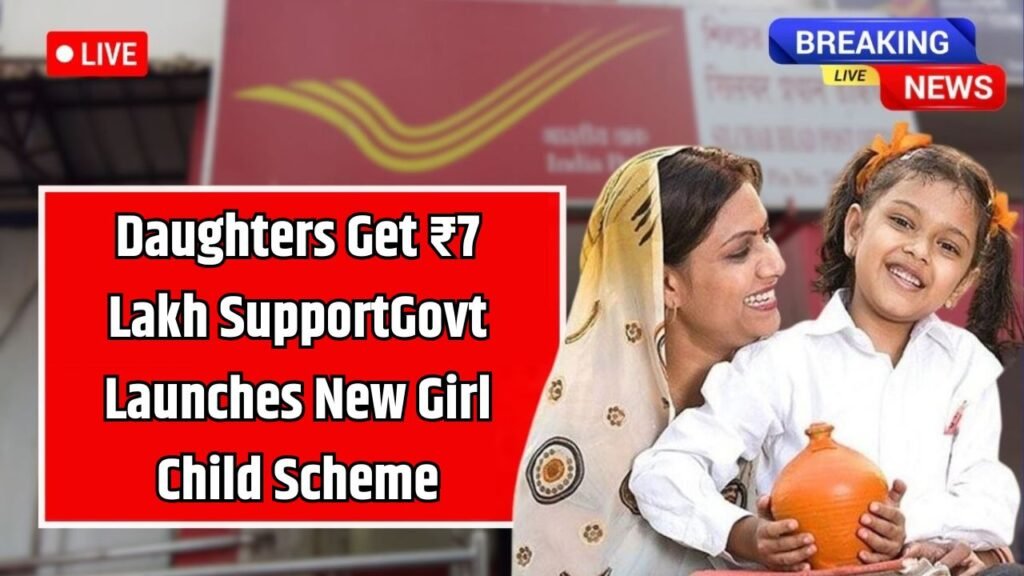The Government of India has recently announced the ₹7 Lakh Girl Child Scheme 2025, a long-term savings initiative aimed at helping parents build a substantial financial safety net for their daughters. The goal is to accumulate a corpus of up to ₹7,00,000 over time via regular contributions and possible government incentives.
This program is intended to reduce financial stress around pivotal life events like higher education, vocational training, or marriage. It also encourages families to adopt disciplined saving practices. Designed to benefit both urban and rural households, the scheme is seen as a move toward gender parity in economic opportunities.
Key Features & Details
| Parameter | Details / Expected Provisions |
|---|---|
| Target Corpus | Up to ₹7,00,000 (goal amount) |
| Account Type / Mode | To be opened in the girl child’s name via post office or government-backed savings instruments |
| Account Opening Age | Likely between birth up to age 10 |
| Lock-in / Maturity | Expected lock-in until age 18 or until the scheme’s maturity |
| Permissible Use of Funds | Higher education, skill training, marriage, or other approved life events |
| Government Support | Possible matching contributions, bonuses, or incentives (yet to be confirmed) |
| Launch Year | 2025 |
Eligibility & Application (Expected)
- The account must be opened in the girl child’s name, by parents or legal guardians
- Child’s age at account opening likely up to 10 years
- Regular savings by parent/guardian over the period
- Indian residents only; income-based eligibility rules may apply (not yet officially released)
- Strict lock-in until maturity or defined age
- Required documents: birth certificate, Aadhaar, proof of residence, identity proofs
- Application will likely be via authorized post offices / banks once official notification is published
Benefits & Strengths
- Gives a dedicated financial base for key life stages—education, skill-building, or marriage
- Encourages habitual savings among families
- Being backed by government-supported institutions, risk is low
- Potential bonus or matching incentives from the government may increase the final corpus
- Helps reduce dependence on loans or debt at critical times
- Contributes toward closing the financial gap between daughters and sons
Challenges & Caveats
- The benefit is long-term; gains accrue slowly over many years
- Final scheme rules (eligibility, government contribution, interest rate, withdrawal norms) are not yet confirmed
- For low-income families, sustaining regular contributions may be difficult
- If rules impose strict lock-in, early withdrawal may not be permitted
- Some families might be excluded depending on future criteria (income ceilings, number of children, etc.)
How This Differs from Existing Girl Child Schemes
- Sukanya Samriddhi Yojana (SSY) is the most well-known existing scheme. It offers interest accrual + tax benefits, and allows partial withdrawal for education or marriage.
- The new scheme seems more goal-oriented (build up to a fixed target corpus) rather than purely interest-based growth.
- It is complementary, not a replacement—existing schemes like SSY will continue to exist.
- Unlike some state schemes that deposit fixed amounts at certain intervals (e.g., Tamil Nadu’s Girl Child Protection Scheme gives a fixed deposit amount at birth) TN , this new scheme appears to rely on continuous savings + incentives.
Facts vs Rumors
Confirmed (based on public reports):
- Scheme launched in 2025
- Target corpus is ₹7 lakh
- Use of post office / government-backed savings channels
Unconfirmed / Rumors:
- Fixed or guaranteed government contribution amount
- Whether early withdrawals will be permitted
- Final interest rate or growth mechanism
- Exact eligibility restrictions (income limits, number of girls per family, etc.)
Steps to Apply (Expected)
- Wait for official government notification and scheme guidelines
- Visit a post office or authorized bank to open the account in the girl’s name
- Submit documents: birth certificate, Aadhaar, proof of residence, identity proofs
- Begin making periodic deposits as per scheme rules
- Track the account and any government incentives
- On maturity or when she attains the specified age, access the funds for education, training, or marriage
Tips for Parents & Guardians
- Open the account early (after birth) and complete KYC / Aadhaar linkage
- Plan a monthly deposit amount that is sustainable
- Maintain documentation of all deposits for verification later
- Monitor official announcements (government portals, newspapers) for updates
- Avoid missed contributions to ensure growth continuity
- Understand proposed rules (lock-in, penalties, withdrawal clauses) when details are published
Tentative Comparison: ₹7 Lakh Scheme vs Existing Schemes
| Feature | ₹7 Lakh Girl Child Scheme (Expected) | Sukanya Samriddhi Yojana / Other Existing Schemes |
|---|---|---|
| Growth basis | Savings + incentives / matching contributions | Interest accrual (variable, governed by small savings rate) |
| Target amount | Fixed goal of ₹7,00,000 | No fixed goal; amount depends on deposits & interest |
| Withdrawal flexibility | Likely restricted until maturity | Partial withdrawal allowed under conditions (education/marriage) |
| Lock-in duration | Until maturity / age 18 or more | Long duration, some flexibility after 18 |
| Tax benefits | Not yet clear | SSY offers tax benefits under Section 80C |
Final Thoughts
The ₹7 Lakh Girl Child Scheme 2025 has the potential to become a transformative instrument for many families, especially those wanting guaranteed support for their daughters’ futures. It signals a move toward financial inclusion and gender equality by combining disciplined saving with possible government collaboration.
However, since many critical features are still pending official confirmation—including contribution structure, withdrawal rules, and eligibility criteria—it’s essential for families to wait for the formal rules and verify them before making commitments.
Disclaimer: This article is for informational purposes only. The final rules, interest rates, eligibility criteria, and government contribution mechanisms will be laid out in the official notifications. Before applying, verify details with authorized banks, post offices, or government sources.







